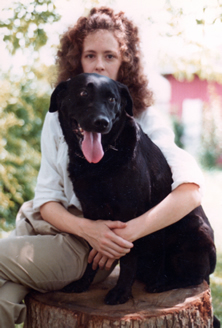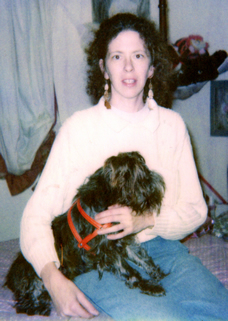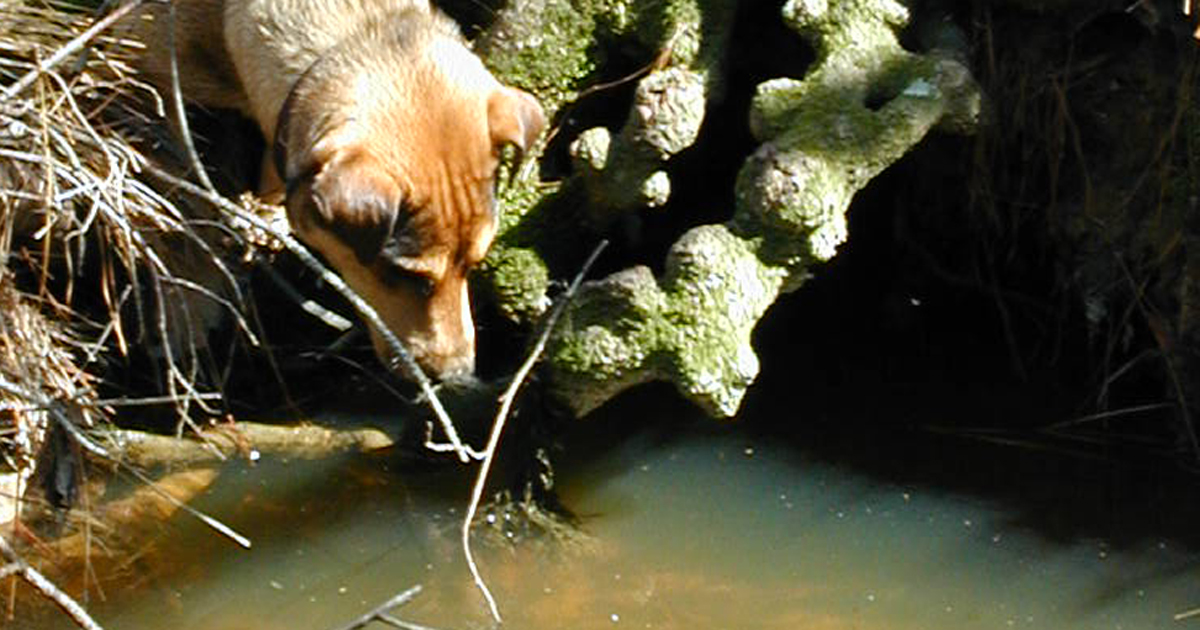I'm taking liberties here, telling Skid's story as though I know his side of it. I am running on imagination based on my interpretations of Skid's behavior as he worked into the human household pack in which he found himself.
You may well ask: how valid are these interpretations? Since I'm sitting here inside my skin and mind, I can't answer that to anyone's satisfaction other than my own. I believe I come fairly close.
A touch of history
Skid quickly learned to relish his occasional role as living teddy bear!
When I was a young, bespectacled, bookish girl, a Shetland pony named Joe-Joe and a St. Bernard named Hector were my constant playmates in a quarter-acre back yard. Family lore has me being a staunch defender of animals — I remember liking St. Francis of Assisi and reading lots of animal stories. I made (and still make) friends with animals. I talk eyes, tail, ears, body placement, and keep in mind that we are all fellow earthlings.
A dash of philosophy
One human being is a multifaceted creature; the social structure of groups of human beings adds a fascinating complexity. When grouped into a species...
Philosophically, humans have been greatly influenced by the likes of brothers Fox and Coyote, Bear, Lion, and Tiger, Horse and Dog — having lived with and against them since before history. We base metaphors about the human condition on what we've observed in the animal world, observations made in the tens of thousands of years before the industrial revolution collected us into sterile urban centers, locked us away from daily meetings with Busy Beaver, Greta Goose, and Bossie Cow.We think we're unique but we're not so sure. We conduct close examination of ourselves and other earth creatures to help us isolate something that is specifically human.
Are we really so special?
Physically, we all — we earth creatures — share similarities. The closer we look at our non-human brethren, the more alike we appear, right down to the DNA. The similarities don't stop with the physiological — socially, we find animals who are loners and leaders, who live for the herd, the hive, the nest, and the pack. We just seem to practice a larger variety of social structures than most.

I got Bo after I moved into my first apartment in college. She was so amazing that if the Web had existed then, I would have created a site telling all about her adventures.
That pattern holds true regardless of what we examine.
Once, we thought our tool use was unique. We know now that other species use tools, some to the point of fashioning them to suit the purpose. We do seem to have an unusual grasp of symbolism, but have discovered that apes can learn sign language and dolphins can operate underwater computer displays. Every time we think of a capability that we alone seem to have, we discover that lo, it ain't so, as soon as we figure out how to check for that capability in another species. Recently, we've moved into testing the psychological arena. We find that our emotional lives, even our vaunted self-awareness, may not be extraordinary.
Psychologically, we already know that we share many traits with our warm-blooded brethren. We learn by trial and error, and are guided by those with more experience than ourselves. What works with lab rats often works with human beings: negative consequences curb certain behaviors and rewards encourage other behaviors. What we learn when young forms the basis of our adult selves — the pup is sire to the dog just as surely as the child is father to the man.
Consider that we are all successful, earth-based creatures, falling mainly to one side or the other of the predator-prey divide, or straddling the line. I'd argue that nothing knows its prey quite as well as the predator that depends upon it for life, and nothing is as aware of its predators quite as much as the prey that must guard against sudden tooth-and-claw death.
With our ability to imagine that which does not exist and our refined and cooperative use of tools, including symbolic language, humans are among the most successful species on the planet today. We should always remember that we are part predator, part prey.
"Us" and "Them"

Punk was a miniature schnauzer that my brother-in-law gave to my daughter. Before Punk, I had a negative attitude toward little dogs, but she showed me that a small dog still his a St. Bernard heart!
Evidence indicates that we used our knowledge of certain prey to eradicate them when we first arrived in Australia and other new areas. Our cows, horses, chickens, pigs, etc. speak to our ability to use our knowledge to make a deal with another species, to bring prey into our daily lives.
We most definitely have destroyed or severely curtailed most of our large predators. But, again, our knowledge of our fellow earth creatures let us make a deal over 30,000 years ago, with true predators who bark at intruders and catch vermin that eat our food stocks.
Now we spend much collective time and effort to defeat our remaining predators: disease and parasites. The only large predator we have that we may never eradicate or isolate is ourselves. Perhaps our murderous nature keeps our numbers down, a little.
Life's lessons
We are all creatures of this small, dynamic biosphere. We must grow, and change, and learn every lesson that presents itself — regardless of the teacher — if we are to survive as a species in our ever changing, ever challenging environment.
I've found dogs to be wonderful teachers of solid life lessons — and not all of them involve turning around three times before laying down.
Skid came to us very nearly feral. He was a dog's dog, and was indeed lucky to be taken into a dog-wise household. It was difficult to teach him how to live with us, but it was well worth it.
If life is for learning, Bubba Doodah Skid was a college professor of canine studies. I'm glad the student was ready when the teacher appeared.
